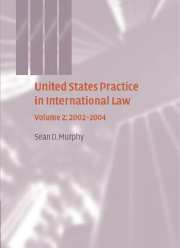Book contents
- Frontmatter
- Contents
- Foreword by Judge Stephen M. Schwebel
- Acknowledgments
- Table of Periodical Abbreviations
- Table of Cases
- Table of U.S. Statutes
- Table of Treaties
- I General International and U.S. Foreign Relations Law
- II State Diplomatic and Consular Relations
- III State Jurisdiction and Immunities
- IV State Responsibility and Liability
- V International Organizations
- VI International Oceans, Environment, Health, and Aviation Law
- VII International Economic Law
- VIII International Human Rights
- IX International Criminal Law
- X Use of Force and Arms Control
- XI Settlement of Disputes
- XII Private International Law
- Annex
- Index
XII - Private International Law
Published online by Cambridge University Press: 10 December 2009
- Frontmatter
- Contents
- Foreword by Judge Stephen M. Schwebel
- Acknowledgments
- Table of Periodical Abbreviations
- Table of Cases
- Table of U.S. Statutes
- Table of Treaties
- I General International and U.S. Foreign Relations Law
- II State Diplomatic and Consular Relations
- III State Jurisdiction and Immunities
- IV State Responsibility and Liability
- V International Organizations
- VI International Oceans, Environment, Health, and Aviation Law
- VII International Economic Law
- VIII International Human Rights
- IX International Criminal Law
- X Use of Force and Arms Control
- XI Settlement of Disputes
- XII Private International Law
- Annex
- Index
Summary
OVERVIEW
The United States has long been an active participant in the development of treaties, rules, and model laws addressing issues of private international law. Between 2002 and 2004, the United States participated in negotiations and meetings concerning various areas of transnational private law, such as commercial and government contracts, civil procedure, and rules for emerging capital markets and insolvency proceedings. Certain initiatives culminated in this period with the adoption of new international conventions such as the UNCITRAL Convention on Assignment of Receivables and the Cape Town Convention on International Interests in Mobile Equipment. Other initiatives, however, remained ongoing as of the end of this period, such as the continuing efforts to develop Hague Conventions on jurisdiction and enforcement of judgments, and on exclusive choice of court agreements. With respect to existing conventions, the U.S. government occasionally issued interpretations of the meaning of particular provisions, as may be seen in its interpretation of the 1949 Convention on Road Traffic. Most interpretations of these conventions, however, occurred within U.S. courts, as demonstrated by the numerous cases that arose with respect to the New York Convention on the Recognition and Enforcement of Foreign Arbitral Awards, and with respect to the more recent Hague Convention on Civil Aspects of International Child Abduction.
PRIVATE COMMERCE
UNCITRAL Convention on Assignment of Receivables
The assignment of receivables has become an important component of international financing.
- Type
- Chapter
- Information
- United States Practice in International Law , pp. 383 - 397Publisher: Cambridge University PressPrint publication year: 2006



